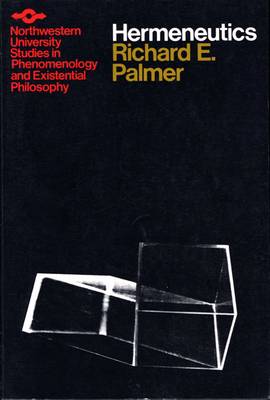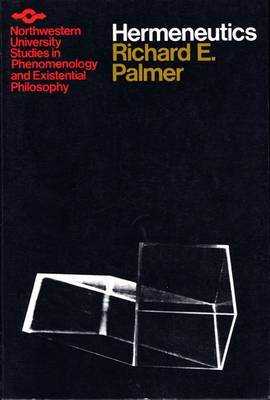
- Afhalen na 1 uur in een winkel met voorraad
- Gratis thuislevering in België vanaf € 30
- Ruim aanbod met 7 miljoen producten
- Afhalen na 1 uur in een winkel met voorraad
- Gratis thuislevering in België vanaf € 30
- Ruim aanbod met 7 miljoen producten
Zoeken
Hermeneutics
Interpretation Theory in Schleiermacher, Dilthey, Heidegger, and Gadamer
Richard E Palmer
€ 34,95
+ 69 punten
Omschrijving
Hermeneutics introduces English-speaking readers to a field of increasing importance in contemporary philosophy and theology-hermeneutics, the theory of understanding, or interpretation. Hermeneutics is concerned with the character of understanding, especially as it is related to interpreting linguistic texts. It goes beyond mere philological methodology, however, to questions of the philosophy of language, the nature of historical understanding, and ultimately the roots of interpretation in existential understanding. Palmer principally treats the conception of hermeneutics enunciated by Heidegger and developed into a "philosophical hermeneutics" by Hans-Georg Gadamer. He provides a brief overview of the field of hermeneutics by surveying some half-dozen alternate definitions of the term and by examining in detail the contributions of Friedrich Schleiermacher and Wilhelm Dilthey. In the "Manifesto" which concludes the book, Palmer suggests the potential significance of hermeneutics for literary interpretation. When the context of interpretation is pressed to its limits, hermeneutics becomes the philosophical analysis of what is involved in every act of understanding. In this context, hermeneutics becomes relevant not simply to the humanistic disciplines, in which linguistic and historical understanding are crucial, but to scientific forms of interpretation as well, for it asserts the principles involved in any and every act of interpretation.
Specificaties
Betrokkenen
- Auteur(s):
- Uitgeverij:
Inhoud
- Aantal bladzijden:
- 304
- Taal:
- Engels
- Reeks:
Eigenschappen
- Productcode (EAN):
- 9780810104594
- Verschijningsdatum:
- 1/12/1969
- Uitvoering:
- Paperback
- Formaat:
- Trade paperback (VS)
- Afmetingen:
- 150 mm x 226 mm
- Gewicht:
- 430 g

Alleen bij Standaard Boekhandel
+ 69 punten op je klantenkaart van Standaard Boekhandel
Beoordelingen
We publiceren alleen reviews die voldoen aan de voorwaarden voor reviews. Bekijk onze voorwaarden voor reviews.











